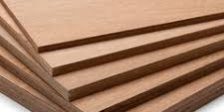Best Marine Wood Alternative
Marine-grade wood plywood is a highly versatile and durable material commonly used for marine and exterior applications. It is typically the material of choice for boat building, docks, and other water-related uses due to its exceptional strength and resistance to moisture. However, marine-grade plywood is often more expensive compared to standard plywood, which has led to the availability of several affordable alternatives that offer nearly the same durability and performance.
1. Fiberboard
Fiberboard is one of the most popular engineered alternatives to marine wood plywood. Made from wood fibers and waterproof glue, fiberboard offers excellent moisture and weather resistance.
There are three main types of fiberboard:
- Low-Density Fiberboard (LDF)
- Medium-Density Fiberboard (MDF)
- High-Density Fiberboard (HDF)
Fiberboard is produced by mixing small wood pieces with high-quality glue, then pressing the mixture into flat sheets under high pressure and temperature. Fiberboard consists of approximately 90% wood and 10% glue and resin.
With good bending strength and moisture resistance, fiberboard is widely used in furniture, construction, and packaging. Like marine wood plywood, it performs well in moist environments.
Fiberboard Pros:
- Affordable: Less expensive compared to solid wood and marine wood plywood.
- Versatile: Suitable for various applications.
Fiberboard Cons:
- Less Durable: Although strong, fiberboard doesn’t match the long-term durability of solid wood.
2. Fiber Cement Board
Fiber cement board is a robust material produced through the Hatschek process, using a blend of cellulose fiber, silica, and Portland cement. Known for its resistance to moisture, termites, and its excellent sound and heat insulation properties, fiber cement board is ideal for both interior and exterior applications.
This eco-friendly material is non-toxic and does not pose a risk to human health. Available in various thicknesses (from 4mm to 20mm), fiber cement board is commonly used in construction for cladding, roofing, and wall panels.
3. Reinforced Polyurethane Foam
Reinforced Polyurethane Foam is a lightweight and strong material widely used in both interior and exterior applications. It has excellent moisture resistance, low thermal conductivity, and is highly durable. Its closed-cell structure makes it resistant to water penetration and ensures good insulation properties.
4. Ribbon Grain Wood Plywood
Ribbon grain wood plywood is created by gluing multiple thin layers of wood together, with the grain of each layer arranged perpendicular to one another. This process enhances its strength and moisture resistance, making it an ideal alternative to marine wood plywood for various construction and manufacturing needs.
Ribbon grain plywood typically comes in sheets ranging from 8 to 10 feet in length and is a durable solution for both interior and exterior use.
5. Weather and Boil Proof (WBP) Wood Plywood
WBP wood plywood is a high-performance material designed to withstand extreme conditions. Made by gluing multiple layers of thin wood veneers, the grains of each layer are positioned at 180 degrees from each other. The advanced cross-hatching technology used in the production process makes WBP plywood stronger and more durable, providing excellent resistance to both moisture and boiling water. It is commonly used in marine and exterior applications where high durability is required.
6. Wood Plastic Composite (WPC)
Wood Plastic Composite (WPC) is a hybrid material made by combining wood fibers with thermoplastics like PE, PP, PVC, or PLA. WPC is highly durable and resistant to weather, moisture, and insects. Its versatility makes it ideal for both interior and exterior applications, including railings, fences, landscaping, cladding, and park benches.
WPC Pros:
- Durable: Withstands harsh weather and environmental conditions.
- Low Maintenance: Does not require painting and is easy to clean.
- Easy to Work With: Can be bent and shaped easily for complex installations.
WPC Cons:
- Lacks Natural Wood Texture: The hybrid nature of the material means it does not have the same texture as solid wood.
7. Birch Wood Plywood
Birch wood plywood is a high-quality, lightweight material known for its strength and durability. Made by gluing multiple thin layers of birch veneer together with waterproof glue, it provides excellent mechanical properties. Each veneer is around 1.4mm thick, and the resulting plywood is often used in a variety of construction and design applications where both strength and appearance are crucial.
Conclusion
There are numerous alternatives to marine wood plywood available in Malaysia, each offering unique benefits for various applications. Whether you need moisture resistance, durability, or cost-effectiveness, there is an option to meet your needs. Understanding the strengths and limitations of each material will help you make an informed choice based on your specific project requirements.
What are your thoughts on using these marine wood plywood alternatives? Feel free to contact Creatimber Global Sdn Bhd for expert advice on selecting the best wood products for your needs.
For more information on wood products, visit Creatimber Global Sdn Bhd.




